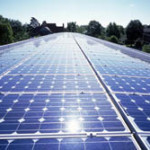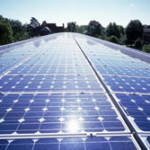The government has begun installing solar panels on the rooftops of public buildings in Male’, under the Japanese government-sponsored ‘Project for Clean Energy Promotion in Male’.
This morning President Mohamed Nasheed clambered onto the roof of the President’s office to bolt down and wire up a panel, 20 kilowatts worth of which have already been installed all over the building.
The project’s 395 kilowatts of panels will ultimately cut down the fossil fuel usage of installed buildings and ultimately energy bills by 30 percent, under the State Electric Company (STELCO)’s new feed-in tariff.
Speaking during the ceremony to launch the project, Nasheed said a transition away from fossil fuels would increase the energy efficiency of the Maldives by 20-30 percent by the end of 2013.
Nasheed has previously installed 48 solar panels on the roof of his residence, Muleeage, provided gratis by LG Electronics Califorian company Sungevity. Those panels generate 11.5 kilowatts of peak output, enough to power almost 200 standard 60 watt light bulbs, and will save the country US$300,000 over the life of the system.
Minivan News understands that the government is currently revising the draft feed-in tariff – which is currently operative – to make it attractive to companies willing to invest the upfront costs of powering remote islands with solar electricity.
The government has endorsed solar as the best renewable option for reaching its goal of becoming carbon neutral by 2020, a goal that has broadened from one of environmental concern to an economic imperative.
Last year the Maldives spent 16 percent of its GDP on fossil fuels, making the country extremely vulnerable to even the tiniest oil price fluctuations and adding an economic imperative to renewable energy adoption.
Data collected by the President’s Energy Advisor, former mining engineer Mike Mason, shows that it presently costs between 28-29 cents to produce a kilowatt hour in the Maldives at best, and 77 cents per kilowatt hour at worst.
“Anything beyond 28-29 cents for a big island and 32-33 cents for a small island is just money being burned,” Mason said during the recent Slow Life Symposium held at the upmarket Soneva Fushi resort.
The cost of providing solar electricity straight from the panel was far below the cost of using diesel on any island, including Male’, Mason explained.
Mason collected data on energy usage from the island of Maalhos in Baa Atoll, and found that by pointing the solar panel in the same direction all day, “you can meet midday demand easily. But between 6-11 am in the morning, and after 2pm in the afternoon, you still need to meet the cooling load of fridges and air-conditioners.”
Mason had two suggestions – the first was to use (more expensive) tracking solar panels that would follow the sun and extend the daytime period in which demand could be met using solar. This would also generate the maximum yield from each panel, mitigating another problem – space.
“The challenge will be getting tracking to work in a hot, humid, salty environment,” he acknowledged, particularly if the panels were mounted in shallow lagoons.
The cost of providing electricity from solar in conjunction with current commercially available battery technology was not much different from existing diesel arrangements on many islands, Mason observed. “You lose 20 percent of the electricity putting it in and taking it back out, and it is expensive to fix. It’s not good enough.”
However on Maalhos, Mason noted, 28 percent of the electricity demand was for cooling.
“I had a think about storage. We could use really cold water refrigerated during the day, and use that to drive air-conditioning and fridges at night. This applies as much to resorts as it does home islands.”
This innovation would drop the cost to the level of the country’s most efficient diesel generators, Mason explained. For those powerplants currently running at 77 cents a kilowatt, “this is an opportunity to print money – and there aren’t many of those available to the government.”






I like Mason's idea of using chilled water for powering cooling plants during the dark hours. Why don't we carry out a feasibility study of this? What's our National University doing with regard to research in this area. Surely, we have enough engineers and scientists to carry out pilot scale studies into this and other forms of efficient solar generation.
As Mason points out, the most effective way would be to use tracking panels mounted on the shallow lagoons surrounding our islands. However, we need to do some studies on how panels cope with the hot, humid and salty environment. We could even come up with technology that will mitigate the effects of such a harsh environment. We need people who can think outside the box. C'mon Hassan Hameed, put your thinking hat on, and get some useful research going...
Can the Maldives afford the initial capital investment necessary to switch to renewable energy sources?
If we conduct this program under the controversial PPP-method employed by the current government, will revenue-earning measures by the private party take a heavy toll on consumers?
Is this the most important issue facing us at the moment or is this like buying a poodle for your handbag when you cannot even afford basic groceries?
Lead by experience. Not by dictating others what to do. This what we want to see in this country. A leader not a Mullah.
@ tsk tsk
If oil hits $150/barrel, we won't have enough money for groceries or a bag to put them in.
Surely it's better to get off the oil hook while we still can?
"Is this the most important issue facing us at the moment..."
You may not think so from the comfort of your living room, but for the Maldives, this is an unquestionable priority. As Leena points out, the price of oil is headed only one way and within a very short space of time, we won't be able to afford any of it.
As I've said before there are plenty of bureaucrats masked as technocrats running around Nasheed's inner circle who are coming up with unworkable solutions to our energy problems.
So far, I also do not see any serious attempts at educating the public about energy efficiency. If 30% of energy bills can be saved by this project's supposed 395 kilowatt capacity, I wonder how much more could be saved by paying attention to energy efficiency.
Public buildings are notorious for wasting energy and taking a grip of that is a much higher priority in my mind than Nasheed donning a hard hat and a hammer! How about "Nasheed" brand energy efficient devices?
Tsk Tsk
How can this be unimportant???? Idiot.
I think it would be easier and less constly to clean our seas full of plastic bottles than installing solar panels.
Why do we ignore the fact that every single inhabited island of ours has a part of its surrounding lagoon filled with rubbish comprising mostly of non-biodegradable stuff?
Of course, cleaning our islands will not give us a medal. But installing solar panels might?
I wonder how much Heavy Load and Mega Maldives would get out of this.
Kareemuddin: it's not about making an 'either/or' decision. Yes we DO need clean lagoons but why do we need to stop the solar panel project to get the nation to stop dumping garbage in the sea? Installing the solar panels is a direct action to reduce non-renewable energy consumption. It's a step to reduce combustion, reduce green house gases, reduce global warming and a small step for our future.
Another public stunt by Anni. Wonder if he actually uses any of these solar panels!!